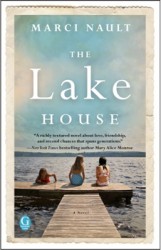By Marci Nault
There’s energy to an aspiring writer trying to bring their work to publication – a mixture of fear and desperation and the strong knowledge that they’ve written the next best seller if only someone would look at it. They’re willing to do just about anything including cornering agents and editors in bathrooms at writer’s conferences in the hope of being signed.
As a published author with Simon & Schuster I’ve had strangers ask, “If I gave you my manuscript would you give it to your agent or editor?” Acquaintances have used my name in queries without my knowledge thinking that it would somehow get them that elusive deal.
There’s a belief that the “in” is all that’s needed to get a six-figure contract, movie rights sold, and a five-star book tour that leads to fame and glory. Aspiring authors desperately want this dream and no matter how many people tell them the reality they don’t want to listen. The truth can be depressing; it can kill dreams because there’s nothing harder than giving your spare time to writing a novel wondering if it will ever make it to the shelves.
There’s a way to success, but it takes patience.
Here’s the truth. Writing is an art form and a business. No one would expect to walk into the corporate offices of Google without any experience and expect to be CEO within months. An athlete doesn’t believe they can train for two years and become an Olympic champion. But this is what aspiring writers expect. The only true way to become a working novelist is to start at the beginning and build a foundation.
The first step is creating the best possible manuscript. This should be common sense, but repeatedly I’ve heard, “I wrote my book in three months and I’m ready to submit and have it published.”
Great writing takes revision and patience. The first draft is just a sketch, the second colors in the lines, the third brings out the details forgotten while writing the big picture, and the fourth is the flow to make the story seamless and easy for the reader to follow. With each revision the writer should be studying and learning better technique.
It’s surprising how many aspiring writers skip over this step and rush to find the “in” assuming their idea is so fabulous an editor will buy it based on concept and then make the necessary changes. I liken the editorial process to a coach and an athlete. They take a great product and guide it to perfection. Editors don’t have time to work with unskilled writers even those with incredible concepts.
Marci Nault’s debut novel, The Lake House (Gallery/ Simon & Schuster) was a Chicago Tribune, Cape May Herald, and CBS summer read pick. Originally from Massachusetts, today she can be found figure skating, salsa dancing, hiking and wine tasting around her home in California. Marci is the founder of 101 Dreams Come True, a motivational website that encourages visitors to follow their improbable dreams. Her story about attempting to complete 101 of her biggest dreams has been featured in newspapers and magazines nationwide, and she regularly speaks on the subject on radio stations in both the United States and Canada.


